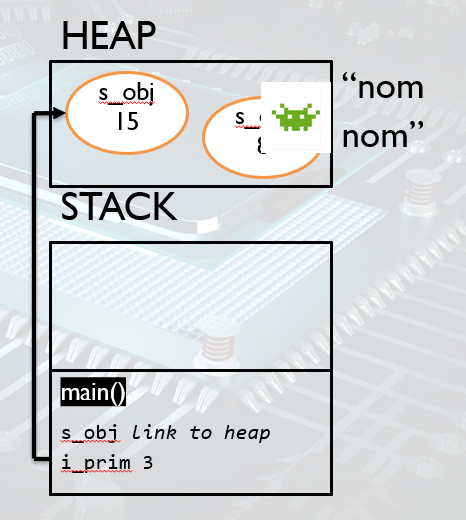The Heap
A Simple Class
We will use the simple class below for our examples.
public class simple
{
private int num;
public simple(int a) { num = a; }
public void set(int a) { num = a;}
public int get() { return num; }
}
- One variable num
- One constructor
- One set method
- One get method
The Setup
Code Starts
main();
- Calling a method adds a frame to the stack
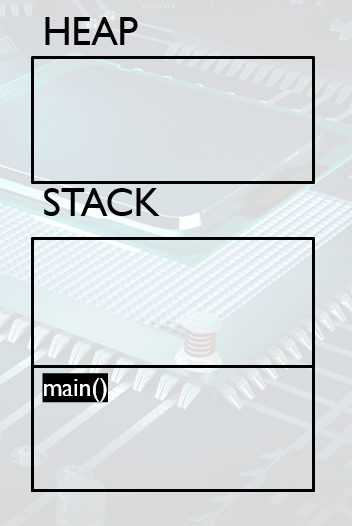
Creating a primitive
public main()
{
int i_prim = 3;
}
- Primitive variables are stored in a frame
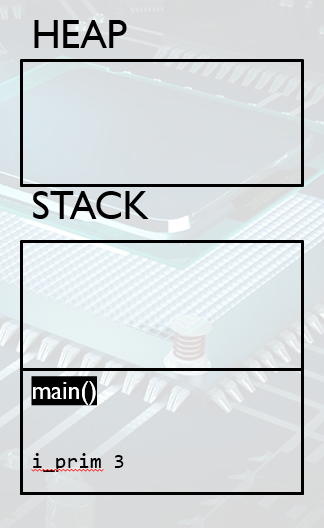
Creating a object
public main()
{
int i_prim = 3;
simple s_obj = new simple(5);
}
- Objects are stored in the Heap
- A link to the object is stored in the frame
- A reference
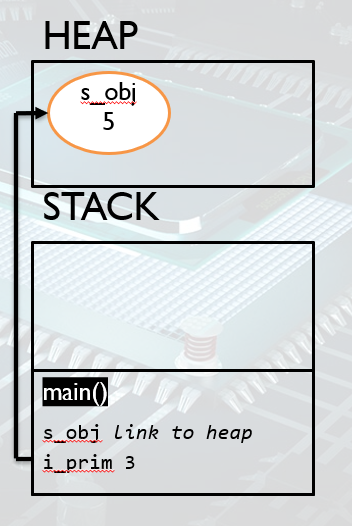
Objects in memory
Objects are stored on the heap. When an object is created two memory locations are set up
- In the heap the object is created
- In the current frame the memory address of that object is stored
simple q = new simple(9);- q stores the memory address, in the heap, of an object of type simple that stores the value 9
Creating an object
public main()
{
int i_prim = 3;
simple s_obj = new simple(5);
}
- Objects are stored in the Heap
- A link to the object is stored in the frame
- A reference
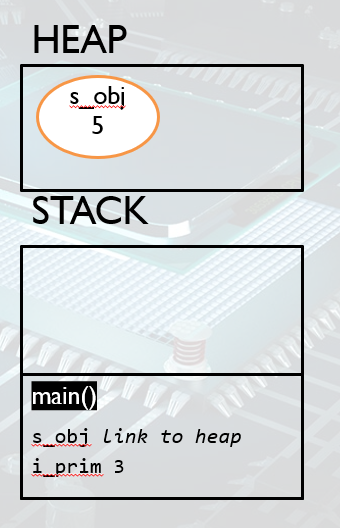
Changing an object
public main()
{
int i_prim = 3;
simple s_obj = new simple(5);
s_obj.set(10);
}
- Changes to the object are changes to the heap
- The frame is unchanged
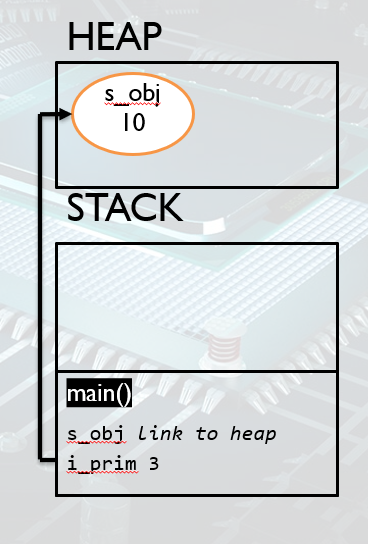
Passing objects as parameters
public main()
{
int i_prim = 3;
simple s_obj = new simple(5);
s_obj.set(10);
test(i_prim, s_obj);
}
public test(int a, simple b)
{
a = 6;
b.set(15);
}
- Objects can be passed as parameters
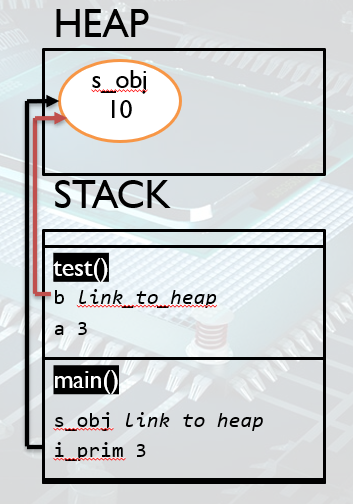
Passing object links as parameters
public main()
{
int i_prim = 3;
simple s_obj = new simple(5);
s_obj.set(10);
test(i_prim, s_obj);
}
public test(int a, simple b)
{
a = 6;
b.set(15);
}
- Objects can be passed as parameters
- Remember though that it is the reference we are passing
- The link to the heap

Primitives are passed by value
so only the local value changes
public main()
{
int i_prim = 3;
simple s_obj = new simple(5);
s_obj.set(10);
test(i_prim, s_obj);
}
public test(int a, simple b)
{
a = 6;
b.set(15);
}
- Changing the primitive parameter changes only the local variable
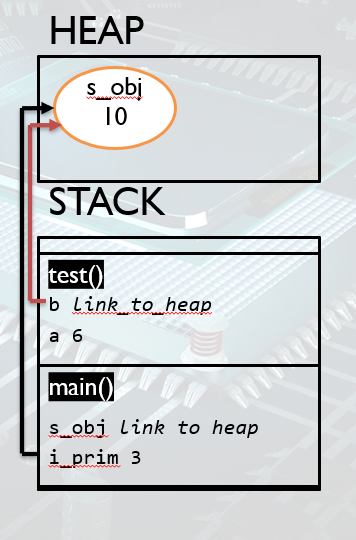
Objects are passed by reference
so only the local value changes
public main()
{
int i_prim = 3;
simple s_obj = new simple(5);
s_obj.set(10);
test(i_prim, s_obj);
}
public test(int a, simple b)
{
a = 6;
b.set(15);
}
- The object changes on the heap so the object changes everywhere
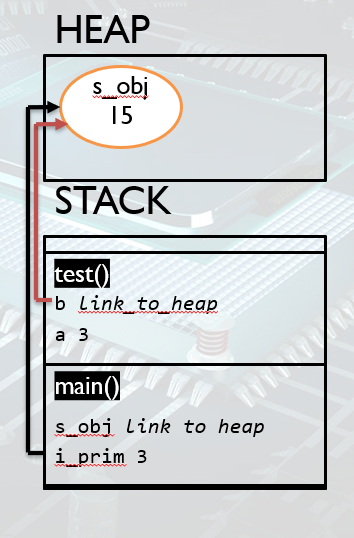
Objects changes are persistent
They stay changed after the method exits.
public main()
{
int i_prim = 3;
simple s_obj = new simple(5);
s_obj.set(10);
test(i_prim, s_obj);
}
public test(int a, simple b)
{
a = 6;
b.set(15);
}
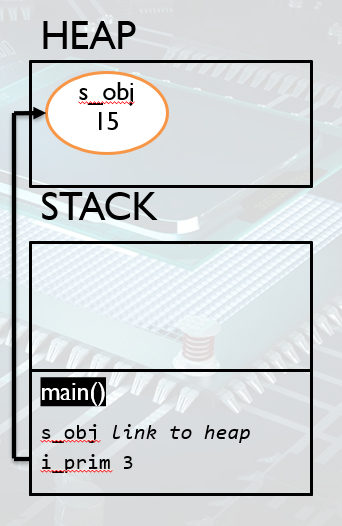
Objects as parameters
Objects themselves are not actually passed as parameters. Instead the memory address of the object is passed. The memory address is passed like a primitive variable.
Object reference is a local primitive variable
public main()
{
int i_prim = 3;
simple s_obj = new simple(5);
s_obj.set(10);
test(i_prim, s_obj);
}
public test(int a, simple b)
{
a = 6;
b.set(15)
b = new simple(8);
}

Object reference is a local primitive variable
public main()
{
int i_prim = 3;
simple s_obj = new simple(5);
s_obj.set(10);
test(i_prim, s_obj);
}
public test(int a, simple b)
{
a = 6;
b.set(15)
b = new simple(8);
}
- This creates a new object on the heap
- It does not change the original object, nor does it affect the original link
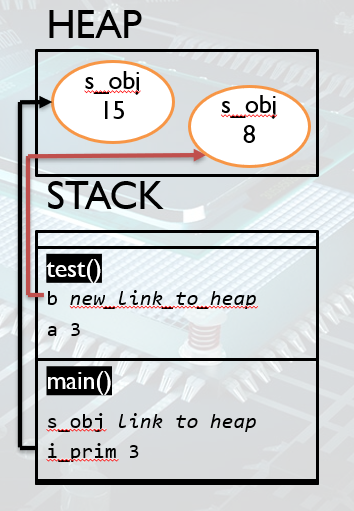
Object scope
public main()
{
int i_prim = 3;
simple s_obj = new simple(5);
s_obj.set(10);
test(i_prim, s_obj);
}
public test(int a, simple b)
{
a = 6;
b.set(15)
b = new simple(8);
}
- When test() exits, the second object is deleted
- Objects are deleted when they have no handles to them
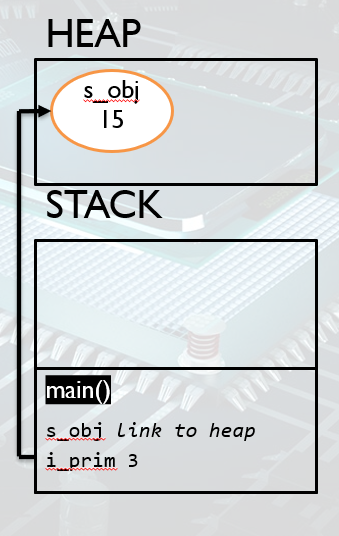
Garbage collection
public main()
{
int i_prim = 3;
simple s_obj = new simple(5);
s_obj.set(10);
test(i_prim, s_obj);
}
public test(int a, simple b)
{
a = 6;
b.set(15)
b = new simple(8);
}
- Technically the object still exists but we have no way to access it
- Java’s garbage collection will eventually notice we have no link and delete the object
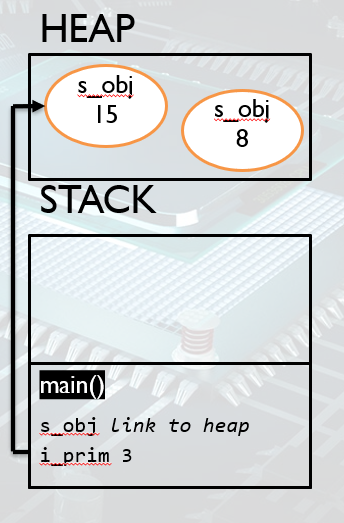
Garbage collection
Some Time Later
public main()
{
int i_prim = 3;
simple s_obj = new simple(5);
s_obj.set(10);
test(i_prim, s_obj);
}
public test(int a, simple b)
{
a = 6;
b.set(15)
b = new simple(8);
}
- Technically the object still exists but we have no way to access it
- Java’s garbage collection will eventually notice we have no link and delete the object
